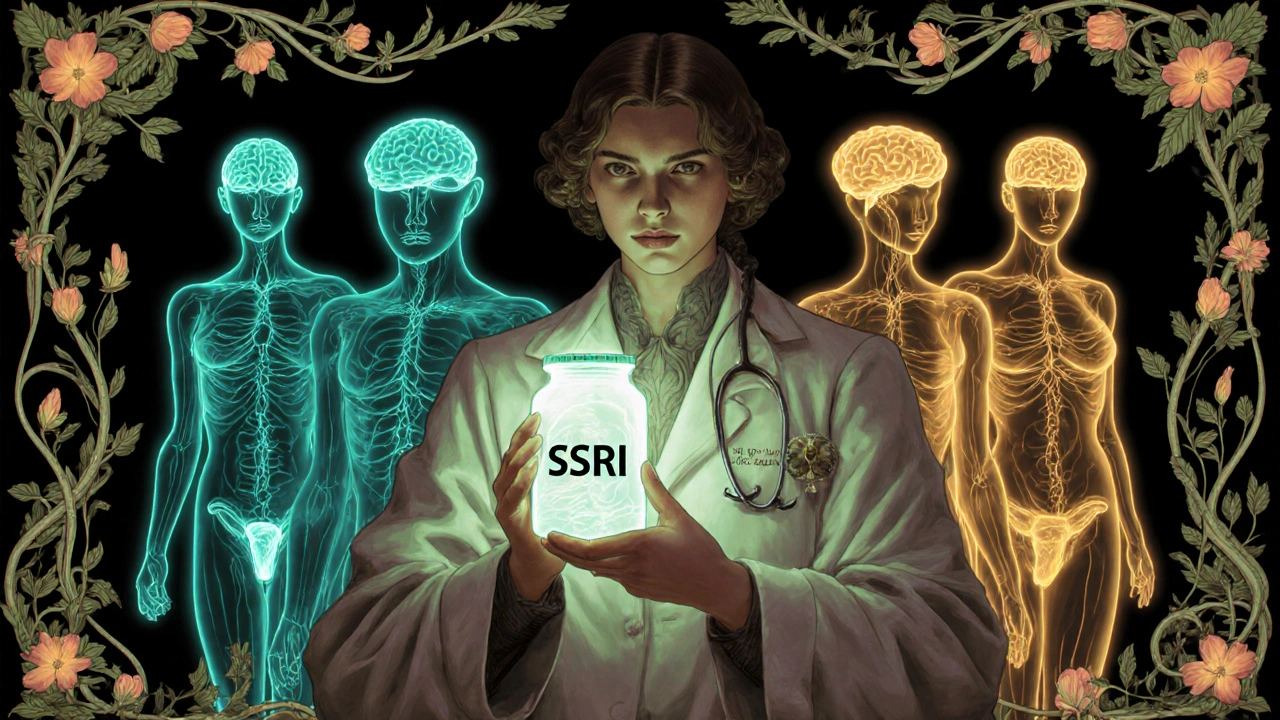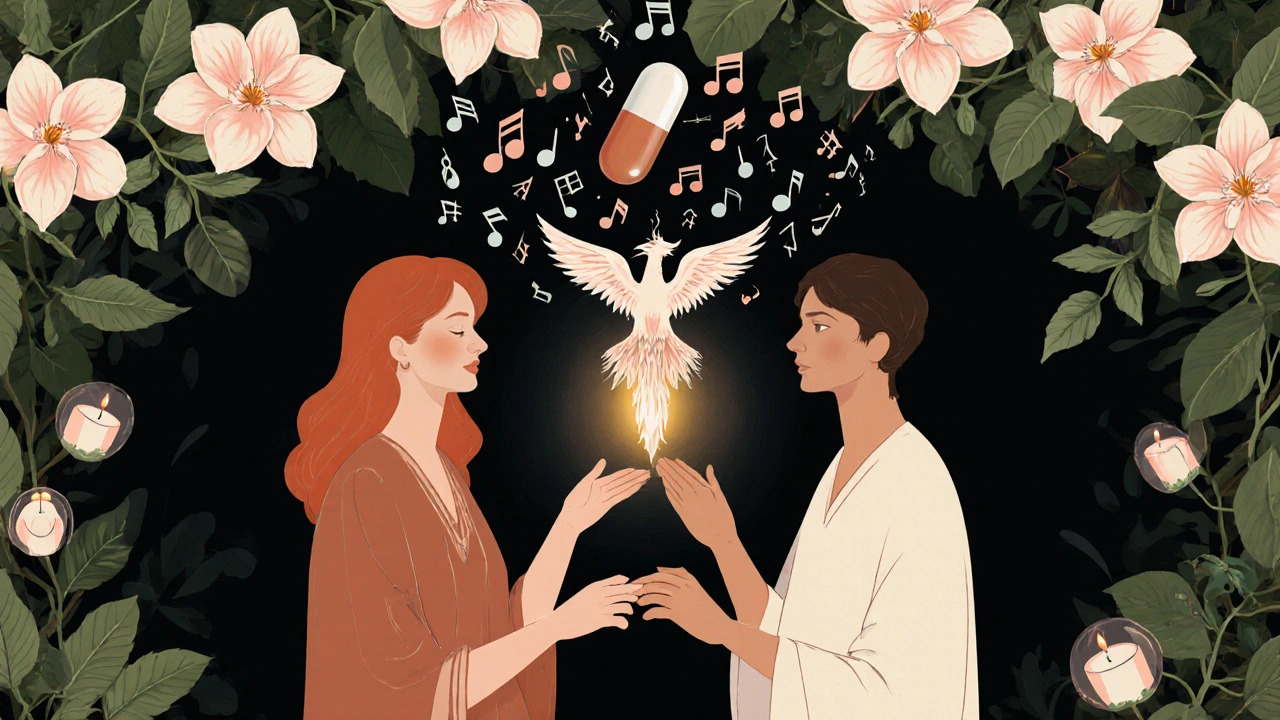Managing SSRI Sexual Dysfunction: Dose Changes, Switches, and Adjuncts

Nov, 6 2025
SSRI Sexual Dysfunction Treatment Calculator
This tool helps you determine the most appropriate treatment option for SSRI sexual dysfunction based on your specific circumstances. Answer the following questions to get personalized recommendations.
Step 1: Depression Severity
Step 2: Duration on Current SSRI
Step 3: Current SSRI Medication
Step 4: Treatment Goals
Step 5: Past Withdrawal Symptoms
Personalized Recommendations
Sexual side effects from SSRIs aren’t rare-they’re common. If you’re taking an SSRI for depression and notice your libido has dropped, orgasm feels out of reach, or sex just doesn’t feel the same, you’re not alone. Studies show 35-70% of people on SSRIs experience some form of sexual dysfunction. It’s not just a minor annoyance. For many, it’s the reason they stop taking their medication. The real problem? Doctors often don’t bring it up first. A Harvard Health poll found 73% of patients say their provider never mentioned sexual side effects before prescribing an SSRI. That needs to change.
What Does SSRI Sexual Dysfunction Actually Feel Like?
It’s not one thing. It’s a mix. For men, it’s often trouble getting or keeping an erection. For women, it’s reduced lubrication or trouble reaching orgasm. But the most common complaint across genders? Dampened pleasure. People describe it as feeling emotionally numb during sex, like the intensity of orgasm has been turned down to half volume. Some can still climax, but it feels flat, mechanical, or distant. Others can’t reach orgasm at all-no matter how much stimulation. This usually starts within the first two to four weeks of starting the SSRI. And here’s the catch: up to half of people with depression already had sexual issues before starting medication. That makes it harder to tell if the problem is the illness or the treatment.Why This Happens: The Serotonin Connection
SSRIs work by increasing serotonin in the brain, which helps lift mood. But serotonin doesn’t just affect emotions-it also shuts down sexual response pathways. High serotonin reduces dopamine, the neurotransmitter tied to desire, arousal, and pleasure. It also interferes with nitric oxide, which is needed for blood flow to the genitals. The result? Less drive, less response, less satisfaction. Not all SSRIs are equal here. Paroxetine is the worst offender, with the highest rates of sexual side effects. Fluoxetine and sertraline are better, but still problematic. Fluoxetine is especially tricky because it sticks around in your body for weeks, making dose adjustments or drug holidays less effective.Option 1: Lower the Dose
If your depression is mild to moderate, cutting your SSRI dose by 25-50% can help. Studies show this improves sexual function in 40-60% of cases without losing antidepressant benefits. You don’t have to stop the medication-you just take less. For example, if you’re on 40mg of sertraline daily, try 20mg. Do this under your doctor’s supervision. Monitor your mood closely for two weeks. If your depression worsens, go back to the original dose. This approach works best for people who’ve been stable on their medication for a few months. It’s not ideal for those with severe depression or recent relapses.Option 2: The Drug Holiday
A drug holiday means skipping your SSRI for 48-72 hours before planned sexual activity. It’s not for everyone. This only works with SSRIs that leave your system quickly-like sertraline, citalopram, or escitalopram. Fluoxetine? Forget it. Its half-life is over two weeks. You’d need to stop for months to make a difference. For those who qualify, studies show a 60-70% improvement in orgasm problems. But there’s a risk. About 15-20% of people get withdrawal symptoms: dizziness, nausea, brain zaps, anxiety. If you’ve ever had withdrawal before, this isn’t safe. Also, don’t try this if you’re on a tight schedule-you can’t predict when you’ll feel like being intimate. And never skip doses without talking to your doctor. Abrupt stops can destabilize your mood.
Option 3: Switch Antidepressants
If dose changes and holidays don’t work, switching meds is next. The goal is to find an antidepressant that helps your mood without killing your sex life. Bupropion (Wellbutrin) is the top choice. It works on dopamine and norepinephrine, not serotonin. Studies show 60-70% of people see big improvements in desire and orgasm after switching. But it’s not a magic fix. You need to taper off your SSRI slowly over 1-2 weeks, then start bupropion at 75mg daily. Increase to 150mg twice daily over 2-4 weeks. About 25-30% of people with severe depression relapse after switching away from SSRIs. So this isn’t for everyone. Other options? Mirtazapine and nefazodone also have lower sexual side effects. But they cause drowsiness in 30-40% of users. Vilazodone and vortioxetine are newer options with fewer sexual side effects-but they cost 40 times more than generic sertraline. For many, that’s not feasible.Option 4: Add an Adjunct-Bupropion
Instead of switching, you can add bupropion to your current SSRI. This is the most studied and effective strategy. In a double-blind trial of 55 people on SSRIs, daily bupropion (150mg twice a day) improved sexual function in 66% of cases. As-needed bupropion (75mg taken 1-2 hours before sex) helped 38%. Daily dosing wins. But there’s a catch: adding bupropion to fluoxetine can trigger anxiety or panic attacks in some people. In one Reddit thread, a user wrote, “Bupropion with fluoxetine gave me panic attacks within 48 hours.” That’s rare, but real. Start low-75mg daily for 3 days, then increase. Watch for restlessness, insomnia, or jitteriness. If side effects hit hard, stop and talk to your doctor. Don’t push through it.Other Adjuncts: Dopamine Boosters and Serotonin Modulators
If bupropion doesn’t work or causes too much anxiety, other options exist. Ropinirole and amantadine are dopamine agonists that can improve arousal and orgasm within 48 hours. But they can cause tremors, dizziness, or hallucinations, especially in older adults. They’re not first-line, but they’re worth considering if other options fail. Buspirone (5-15mg daily) is a serotonin modulator that helps 45-55% of users. It’s safe, non-addictive, and rarely causes sedation. The downside? It takes 2-3 weeks to work. Cyproheptadine (2-4mg as needed) is another option. It blocks serotonin receptors and helps about half of users. But it makes you sleepy. It’s good for occasional use, not daily.
Behavioral Strategies: More Than Just Pills
Medication isn’t the only tool. Many people find relief by changing how they approach sex. Dr. Levine suggests focusing on “dampened orgasm” rather than total absence. Try new stimulation techniques-more touch, more sensation, more time. Couples who used “sensate focus” exercises-non-goal-oriented touching without pressure to perform-saw 50% improvement in satisfaction, even while still on SSRIs. Communication matters. Talk to your partner. Say, “I’m on medication that makes sex feel different. Let’s figure this out together.” Avoid blame. Focus on connection, not performance. Some people find that scheduling sex helps. Instead of waiting for spontaneous desire-which SSRIs kill-plan it. Make it a ritual. Light candles, play music, take a bath together. Create an environment that overrides the chemical dampening.What About Persistent Sexual Dysfunction After Stopping?
This is the scary part. Some people say their sexual problems stick around for months-or even years-after stopping SSRIs. The Therapeutic Goods Administration (TGA) issued a warning in June 2023 about this. Case reports exist. But here’s the reality: we don’t know how common it is. A 2023 review of 19 studies found only 8 met quality standards. Most data is from patient stories, not controlled trials. Still, if you’ve been on SSRIs for years, be aware this is a possibility. Don’t panic. But do report any lasting symptoms to your doctor. There’s no proven treatment yet, but some find improvement with physical therapy, counseling, or time.What Should You Do Next?
Step 1: Track your symptoms. Use a simple journal. Note your mood, libido, arousal, and orgasm ability each week. Step 2: Talk to your doctor. Bring your notes. Ask: “Is this SSRI-related? What are my options?” Don’t accept silence. Step 3: Try one strategy at a time. Don’t switch meds and add bupropion and start drug holidays all at once. Pick one. Give it 4 weeks. Step 4: If nothing works, ask about vilazodone or vortioxetine. If cost is an issue, stick with bupropion augmentation-it’s the most effective and affordable option. Step 5: Consider therapy. A sex therapist can help you rebuild intimacy without relying solely on pills.Final Thought: You’re Not Broken
SSRI sexual dysfunction isn’t a personal failure. It’s a known, predictable side effect of a class of drugs that saves lives. You’re not weak for wanting to feel pleasure again. You’re not selfish for caring about your sex life. Depression already stole so much. You deserve to feel whole-emotionally, physically, and intimately. There are options. They’re not perfect. But they work. And you’re not alone in this fight.Can I just stop my SSRI if sexual side effects are too bad?
No. Stopping SSRIs suddenly can cause withdrawal symptoms like dizziness, nausea, brain zaps, and anxiety. It can also trigger a relapse of depression. Always work with your doctor to taper off slowly if needed. There are safer ways to manage sexual side effects without quitting.
Which SSRI has the least sexual side effects?
Among SSRIs, sertraline and escitalopram tend to have lower rates of sexual dysfunction than paroxetine or fluoxetine. But even these can cause issues. If sexual side effects are a major concern, switching to bupropion, mirtazapine, or vortioxetine may be better options overall.
How long does it take for bupropion to help with sexual side effects?
Bupropion usually takes 2 to 4 weeks to show full benefits for sexual function. Some people notice small improvements in desire or arousal after 1 week, but the biggest changes happen after consistent daily dosing for a month. Don’t give up before then.
Can I use over-the-counter supplements to fix SSRI sexual dysfunction?
There’s no strong evidence that supplements like L-arginine, ginseng, or maca reliably fix SSRI-induced sexual dysfunction. Some may help with general libido, but they won’t reverse the serotonin-related block. Avoid products that claim to be “natural antidepressants” or “SSRI antidotes”-they’re not regulated and can interact dangerously with your meds.
Is it safe to take bupropion with fluoxetine?
It’s possible, but risky. Combining bupropion with fluoxetine increases the chance of anxiety, agitation, or panic attacks. If you’re on fluoxetine, your doctor may recommend switching to sertraline or citalopram first, then adding bupropion. Never combine them without close medical supervision.
How do I know if my sexual problems are from depression or the SSRI?
Depression itself can cause low libido and reduced pleasure. But if your symptoms started or worsened after beginning the SSRI, and you didn’t have them before, it’s likely medication-related. Tracking your symptoms over time helps. If your mood improves but your sex life doesn’t, the SSRI is probably the culprit.
Should I see a sex therapist?
Yes-if you’re struggling with intimacy, communication, or performance anxiety related to SSRI side effects. A sex therapist can help you and your partner rebuild connection without pressure. They’re trained to work with people on medication and understand the biological and emotional layers of this issue.
